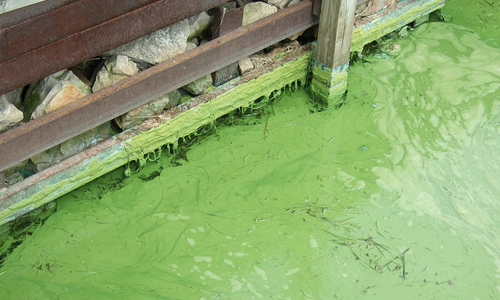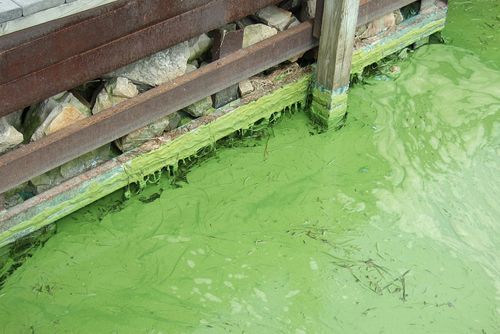
Waterkeeper Alliance: Factory Farm Swine Operation Violates Clean Water Act

The Neuse Riverkeeper Foundation and Waterkeeper Alliance issued a notice of intent on Friday to sue an industrial swine feeding operation in order to stop illegal discharges of swine waste into groundwater, wetlands and streams that flow to North Carolina’s Contentnea Creek and Neuse River watersheds.
The groups will file suit under the federal Clean Water Act if action is not taken to stop the swine waste discharges and clean up the Stantonsburg Farm Swine Facility within 60 days.
The Stantonsburg facility has a long history of illegal discharges and waste management problems, including a major discharge of raw swine waste to a tributary of Contentnea Creek on March 15, 2013, according to the Waterkeeper Alliance.
Wendell H. Murphy, Jr. owns and operates the factory swine farm, which confines more than 4,800 swine in Stantonsburg, NC for a Smithfield Foods subsidiary that was recently acquired by Hong Kong-based Shuanghui International Holdings.
People living near the Stantonsburg Facility have tried unsuccessfully to get the company and the North Carolina Department of Environment and Natural Resources (NCDENR) to help them deal with the odor, fly swarms, swine waste discharges and impacts to their water wells since the facility opened in the 1990s.
“Many of us grew up around here, and have deep connections to the land and waters. We caught crawdads, fished and swam in these waters and purchased land to maintain our connections to the area or have a place of our own that provided a good quality of life,” said Don Webb, a neighboring landowner who acquired property in the late 1980’s, which is adjacent to the swine facility.
“The smell, the flies and the pollution from this facility have destroyed our quality of life and causes constant stress. How would you feel if you couldn’t drink the water from your own well, go to church without the smell of hog waste permeating your clothing or even have a barbeque with friends on your own property?”
Swine waste contains pathogens, nitrogen, phosphorus and other pollutants that can cause fish kills, endanger swimmers, promote blooms of toxic algae and contaminates drinking water when discharged into public waters.
“Discharges of swine waste from the Stantonsburg facility are illegal under the Clean Water Act and have obvious impacts on neighboring landowners that should have merited immediate action from the NCDENR [North Carolina Department of Environment and Natural Resources ],” said Larry Baldwin, CAFO [concentrated animal feeding operation] coordinator at Waterkeeper Alliance.
“Unfortunately, this is not a unique or isolated problem, but one we see across eastern NC. We will continue to document these discharges and take action to stop the most egregious violations, but NCDENR must start enforcing the Clean Water Act prohibitions on discharges of swine waste to NC waterways.”
This is the second Clean Water Act enforcement notice that the groups have had to issue this year to stop swine waste discharges from an industrial swine facility in the Neuse watershed.
There are approximately 500 industrial swine facilities housing roughly 1.8 million animals in the Neuse River watershed. NCDENR often claims that these animal feeding operations in the Neuse operate under state issued “no-discharge” permits, but also admits that swine waste is commonly and directly discharged to public waters from these operations through ditches—a violation of both state and federal law.
Industrialized swine production facilities that discharge pollutants are required to obtain Clean Water Act permits to prevent these discharges, but the U.S. Environmental Protection Agency reports that only 14 Clean Water Act permits have been issued to the roughly 1,200 facilities in North Carolina by the NCDENR.
These waterways drive the local economy in the region, however, the Neuse Estuary regularly experiences algal blooms, fish kills and depletion of oxygen necessary to sustain the fishery as a result of excessive amounts of phosphorus and nitrogen pollution.
The NCDENR acknowledges that its efforts to reduce pollution over the last two decades in the Neuse have failed to achieve “any significant decrease in actual nutrient loading to the estuary,” and that phosphorus pollution in these waterways has actually increased.
“The Neuse Riverkeeper Foundation would like to work with the owners and operators of the Stantonsburg facility to address these serious issues and protect the community and Neuse watershed from illegal swine waste discharges,” said Jim Kellenberger, president of the Neuse Riverkeeper Foundation.
“However, we must take action to address the mismanagement of swine waste and pollution discharges at this facility, and if the facility is unwilling to implement sound swine waste management practices, we will then be forced to file suit to enforce the law and protect the citizens of North Carolina.”
——–
In January, the Neuse Riverkeeper Foundation and Waterkeeper Alliance issued a Notice of Intent to sue the current and former owners and operators of the Stilley swine feeding operation this week to stop illegal discharges of swine waste into groundwater, wetlands and streams that flow to the Trent River. Check out this slideshow for images of the Stilley Swine facility:
[blackoutgallery id=”318072″]
Feb. 27, Waterkeeper Alliance and North Carolina Riverkeepers called on the North Carolina Commissioner of Agriculture, Steve Troxler, to protect public and environmental health against the swine industry’s handling of the porcine epidemic diarrhea (PED) virus outbreak in the state. Check out these graphic and disturbing images of the PED epidemic:
[blackoutgallery id=”323679″]
Visit EcoWatch’s HEALTH pages for more related news on this topic.


 233k
233k  41k
41k  Subscribe
Subscribe 
